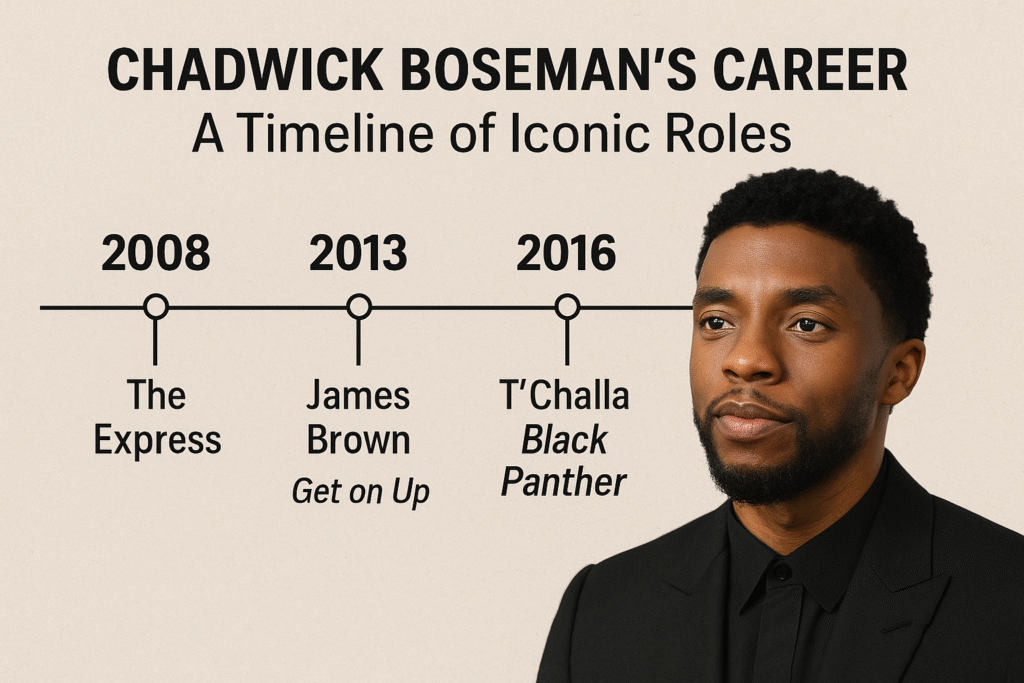Chadwick Boseman’s career was a masterclass in purpose and power, a constellation of roles that not only entertained but also inspired and educated. Though his life was cut tragically short, he left behind a filmography that serves as a timeless testament to his immense talent and profound cultural impact. This timeline traces his journey through the iconic characters that defined a generation and cemented his legacy as a true king of cinema.
2013: Jackie Robinson in *42*
While he had smaller roles before, it was his portrayal of baseball legend Jackie Robinson in *42* that announced Boseman as a leading man of extraordinary depth. He didn’t just play Robinson; he embodied his quiet strength, immense dignity, and simmering fury in the face of relentless racism. Boseman captured the immense psychological weight Robinson carried as he broke Major League Baseball’s color barrier, showcasing an ability to convey volumes with a single look. This role established his signature talent for bringing historical giants to life with humanity and gravitas.
2014: James Brown in Get On Up
Boseman further proved his mastery of the biopic with his electrifying performance as the “Godfather of Soul,” James Brown. He immersed himself completely, capturing Brown’s unique stage presence, volatile genius, and complex persona. His performance was a tour de force of energy and precision, from the flawless dance moves to the distinct vocal cadence. This role demonstrated his fearless commitment and range, proving he could transform into a completely different kind of icon, one defined by flamboyant, raw energy.
2017: Thurgood Marshall in Marshall
In a more focused legal drama, Boseman took on the role of a young Thurgood Marshall, the future first Black Supreme Court Justice. Here, he showcased a different kind of power—the power of intellect and strategic legal mind. The film focused on a single case, allowing Boseman to portray Marshall’s sharp wit, unwavering principle, and the calculated risks he took to fight for justice within a rigged system. It was another pillar in his portfolio of portraying pioneering Black men who changed America.
2018: T’Challa / Black Panther in Black Panther and Avengers: Infinity War
This was the role that catapulted him to global superstardom and cemented his cultural legacy. As King T’Challa of Wakanda, Boseman was regal, powerful, and deeply humane. He brought a soulful introspection to the superhero genre, grappling with the weight of crown, legacy, and the future of his nation. Black Panther was more than a film; it was a global cultural phenomenon. Boseman’s performance was its heart and soul, offering a vision of African majesty, strength, and innovation that resonated across the world, making him a real-life hero to millions.
2019-2021: Final Roles and a Private Battle
Even as he privately battled colon cancer, Boseman continued to deliver powerful work. He returned as T’Challa, and in 2019, he starred in 21 Bridges as a principled NYPD detective. His final film performances, released posthumously, were poignant and powerful. In Da 5 Bloods, he appeared as “Stormin'” Norman, the revered, fallen leader of a Vietnam squad, a mythical figure haunting the memory of his brothers-in-arms. In the adaptation of August Wilson’s Ma Rainey’s Black Bottom, he delivered a career-best performance as Levee, an ambitious, tormented trumpet player. His portrayal was a volcano of raw talent, pain, and defiance, a devastating and brilliant final bow that earned him a posthumous Golden Globe.
Conclusion: An Enduring Legacy
Chadwick Boseman’s career was not a random collection of parts but a curated journey. He consistently chose roles that showcased Black excellence, resilience, and complexity. From sports legends and music icons to civil rights giants and a king from a futuristic Africa, he used his platform to tell stories that mattered. His timeline is short but impossibly dense with impact, leaving behind a body of work that will inspire and awe for generations to come. He was, and remains, a true icon.
Frequently Asked Questions (FAQ)
Q1: What was Chadwick Boseman’s first major film role?
Chadwick Boseman’s first major leading role in a feature film was as Jackie Robinson in the 2013 biographical sports film *42*. This performance served as his breakthrough and established him as a powerful leading man in Hollywood.
Q2: Did Chadwick Boseman do his own singing and dancing in Get On Up?
Yes, Boseman performed his own singing and dancing for the role of James Brown. He underwent extensive training to master Brown’s unique vocal style, dance moves, and stage presence, which was widely praised as an incredible embodiment of the music legend.
Q3: How did Chadwick Boseman prepare for his role as T’Challa in Black Panther?
To prepare for the role of T’Challa, Boseman underwent extensive physical training in martial arts, weightlifting, and stunt work. He also traveled to Africa to research accents, cultures, and customs to inform his portrayal of the Wakandan king, aiming to present a nuanced and authentic representation of African royalty.
Q4: Which of his performances earned him a posthumous Academy Award nomination?
Chadwick Boseman received a posthumous Academy Award nomination for Best Actor for his role as Levee in the 2020 film Ma Rainey’s Black Bottom. His performance was critically acclaimed and is considered one of the most powerful of his career.
Q5: What was significant about the roles Chadwick Boseman chose throughout his career?
Boseman was known for intentionally selecting roles that highlighted Black excellence, historical significance, and cultural impact. From playing iconic real-life figures like Jackie Robinson, James Brown, and Thurgood Marshall to the groundbreaking fictional king T’Challa, he used his platform to tell stories of strength, dignity, and resilience, making a profound impact on both cinema and culture.

